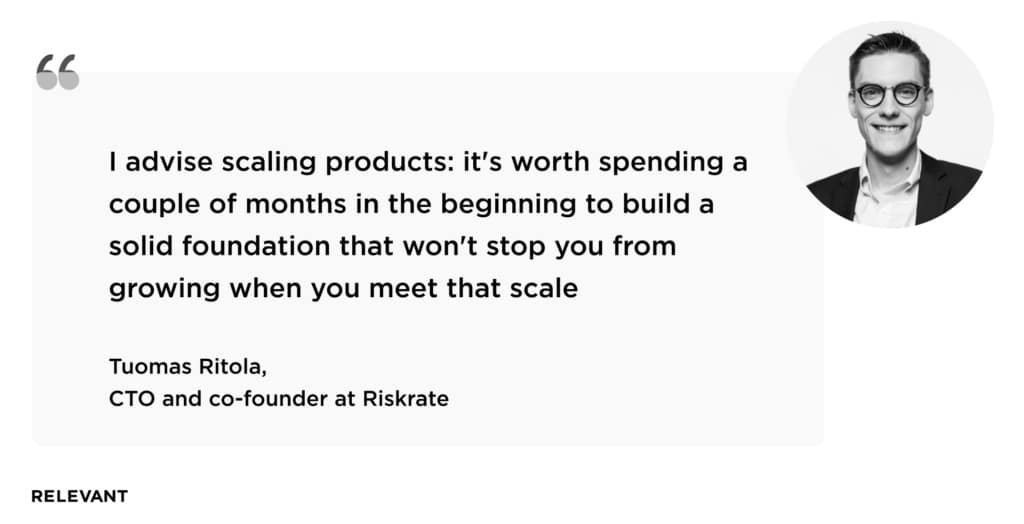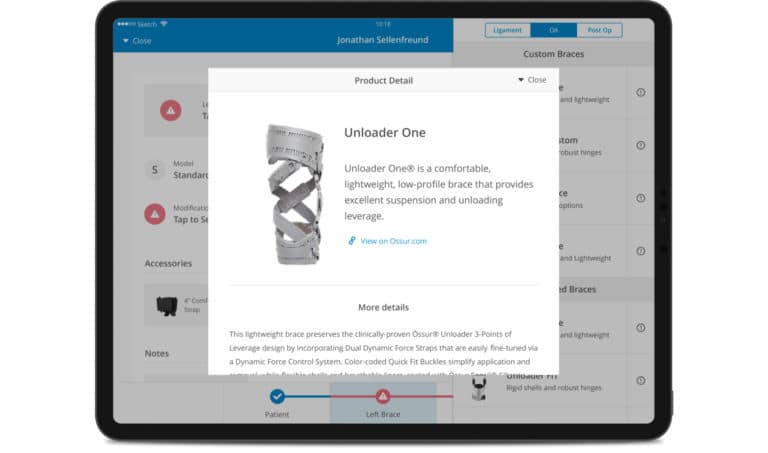How Technology Reshapes the Decision Making on Rapidly Growing Markets
Updated: June 7, 2024
When you want to launch a startup, you need not just an idea that will move you forward but also an understanding of what it takes to run a business and what difficulties you may face.
There are many ways to get insights. One of them is to find out the true business success stories of entrepreneurs who turned a startup idea into a business opportunity through persistence and hard work. Inspirational stories can help you put your hopes and doubts into perspective.

We provide companies with senior tech talent and product development expertise to build world-class software. Let's talk about how we can help you.
Contact usIn this article, three conversations with founders and executives are combined into one. We at Relevant Software asked them how they came up with the idea for their business and how they coped with the inevitable challenges along the way.
Table of Contents
Introducing our guest speakers
Tuomas Ritola, CTO, and Co-Founder at Riskrate – a startup that provides a simple, easy-to-use tool for CEOs and controllers to access and manage the critical business data they need in their daily lives to make better decisions faster.
Luca Schnettler, co-founder, and CEO at Qumata – a company building new standards for life and health insurance underwriting. The Qumata team uses digital data to calculate the risk of diagnosis for over 800 conditions and extra mortalities and morbidities, saving applicants hours filling out long questionnaires or visiting the doctor.
Dan Langevin, co-founder, and CTO at Ideon – an API infrastructure platform for connecting insurance carriers and technology platforms to power digital experiences in employee benefits. Its APIs transmit billions of data points across the health insurance and benefits ecosystem.
Never a bad time to launch a business
Entrepreneurs always wonder when there is a good time to turn their business ideas into reality. It’s obvious why it’s smart to launch in times of a strong economy. People have funds and are looking for ways to spend them. But an equally smart move could be to set your business up during uncertain economic times.
While COVID paralyzed the activities of many organizations, all those companies promoted the ideas of digitalization and have found their niche in the aspect of the transition to remote work. Keep reading to find out how our guests spotted gaps in the market and were able to fill them in times of economic turmoil.
Idea birth
Dan Langevin:
“At Ideon, we’ve spent a lot of time with people in the employee benefits industry – insurance carriers, startups, and HR and benefits administration platform owners. So much of our evolution has come through their own insights and what kind of experience they’re trying to build. We listened to them and then looked at what technologies and resources we have to solve connectivity and data exchange problems in the employee benefits industry.”
Tuomas Ritola:
We help companies understand their business risks so they can avoid that fate. We help them manage risks by themselves by giving more visibility to them.
Luca Schnettler:
“We at Qumata noticed a major gap in the market that we could solve by analyzing digital data. While other industries leaped at digitalization and leveraging data to improve traditional processes, one sector was particularly lagging—insurance underwriting in life and health.”
Market proposal
Dan Langevin:
“We offer an API infrastructure platform to the employee benefits industry that allows technology platforms to connect with insurance carriers so they can quickly exchange data and deliver a seamless consumer experience at every stage, from enrollment to year-round benefits management. By integrating with our APIs, carriers and tech platforms get access to all that plan and member data in one shot for much less cost than they would incur in building the connectivity themselves.”
Tuomas Ritola:
What Riskrate does is help companies grow faster with less risk. We integrate all their data sources, so they get a comprehensive view of their business that is always up-to-date.
Luca Schnettler:
“We offer a specific product that analyzes applicants’ digital data to study medical risk to help insurance companies augment their underwriting. We can integrate up to 1000 other unique variables like medical records, GPS, and wearable data into the process. Our special, proprietary algorithm accurately calculates the extra-mortality, extra-morbidity, and other parameters for any individual and 800 medical conditions. There’s no need for lengthy questionnaires, medical examinations, or requests for GP reports.”
As we can see, our founders realized that what they were working on made sense both from a technical and commercial point of view. It has forced them to focus on problems with the greatest possible chance of contributing to society.
The walking one will master the road
You probably know that developing an MVP (Minimum Viable Product) can be a game changer and help you avoid an incredible startup failure. The discovery phase is the initial step towards creating an MVP that points the direction for future product development and allows you to move and improve.

With such a constant focus on digital transformation, it seems surprising that not every company carries out the discovery phase. Therefore, it was extremely interesting for us to find out how our guests approached this process.
The discovery phase and first MVP
Dan Langevin
“There was nothing like our product in the market. It took a lot of work for people to envision how they might use it. So we built a proof of concept on top of the API to demonstrate its capabilities. We started with the network data and built out the provider’s adopter-to-insurance carriers relationships for a subset of what we offer today. It took about six months. Before we went live in production, we had to use some of that time to build our UI so that we could also demo it.”
Tuomas Ritola:
“Our first version was based on our partners’ professional experiences, so we didn’t have a discovery phase. We created the MVP, contacted some companies, and asked if they were interested in trying out the product. Based on their feedback, we’ve added new features and changed direction a bit. This new product is ten times faster, so we can serve large companies with confidence”.
Luca Schnettler:
“Our discovery phase took probably from 8 to 12 months initially. Our first pilot project was very tense because we didn’t know what would happen. Will the product work and all of this kind of stuff? But now we know what to do. Usually, now it’s a two-to-three-month process.”
The current product
Dan Langevin
“We’re currently balancing new product development and expansion of our product offerings with supporting the growth of existing products. We have customers coming to us asking for new things and extensions of what we do all the time. For each insurance carrier we onboard, we have some work to do to adapt to whatever system they’re using to process these transactions.”
Tuomas Ritola:
“Our new product is completely different from the original version. Everything left of the initial MVP was completely redone in the new version, which is currently in beta and launching soon”.
Luca Schnettler:
“We operated more like a user. So we tried out a lot of different use cases and ended up choosing ones that made the client money, were feasible, and had an element of repeatability with different types of clients.”
As shown, sometimes entrepreneurs initiate the discovery phase, but sometimes the driving force is customer feedback on a solution they already have. The wisdom is that you don’t always have to follow trends blindly – you can tailor processes to suit your needs.
In-house vs. outsourcing: what helped these startups grow
Rapid business scaling is often one of the biggest challenges startups face. Entrepreneurs construct new ideas or capitalize on unique opportunities. In some instances, the solutions require advanced technology that’s beyond their current skill set to comprehend. Therefore, they need to create a strong team of professionals who will take on the task of creating a product and its further development.
The pressure to make business-critical decisions, especially concerning hiring new staff, is only increasing, and in these cases, outsourcing may seem like an attractive alternative. Let’s find out what our founders think about this.
Dan Langevin
“Most of what we developed was developed in-house, but we have used outsourcing for certain pieces of non-core infrastructure. Our philosophy is that full-time employees should build the core infrastructure. We often need several different adapters, so things outside our core infrastructure might translate data into a format we need to process. And that’s what we tend to outsource.”
Tuomas Ritola:
“Initially, the team consisted of our CEO, an advisor, and a junior developer. We’re a bootstrap startup, so the company wasn’t considering outsourcing at the time.
I joined as a co-founder to take the product forward. It will be available for the general public at the end of the year, and we will probably hire some more people to join us in helping our customers to grow faster.”
Luca Schnettler:
“We’re a very data, tech, and design-led business. Having an amazing team capable of enhancing the uniqueness of our offerings has been the foundation of our success. But we have an excellent outsourcing team that helps with the more day-to-day tasks.”
If you also consider outsourcing the ideal solution for your startup, Relevant will be a reliable partner along the way, as we have extensive experience in software development and everything related to technology.
Transformation requires a new mindset
All successful startups have a few similarities in common. They offer innovative solutions, focus on their market niche, and know what their customers want. But in the evolving process, they also have to face difficulties that they have to overcome.
These are not always technological challenges – sometimes, it’s even just an inappropriate name that has to be changed.
Challenges they faced
Dan Langevin:
“We expanded the product suite too aggressively early on, covering too many things. Going back, I would have done that more slowly, given our team size and the capacity to launch those things. The biggest thing that I would change is to remain more focused on each individual product that we launch before moving on to other offerings.”
Tuomas Ritola:
“From a technical standpoint, the biggest issue is what we want to build. This new product has to be linearly scalable. We can simply set up new nodes to scale it up to meet any demand. This puts some limits on what kind of features we can have and how we can implement them. Some of them we can’t bring to the new version of the product because it will lead to bottleneck or failure points.”
Luca Schnettler:
“In this aspect, it is worth mentioning our first name – Healthy Health. We got consistent feedback that it was one of the world’s worst names conceived. And one of our investors, jokingly, told us, “If you want our money, you have to change your name.” So, we changed it to Qumata, which stands for “quantifying human data,” which is, I think, a little bit more in the area of what we do.”
Plans for the upcoming year
Dan Langevin:
“As we build more product offerings, this expands the customer base. And our customers expect higher speed and precision from us, as they are trying to provide modern user experiences and have challenges in providing data support. The bar keeps getting raised. Every year we receive higher expectations from our customers regarding the level of our service, and we constantly strive to meet this level.”
Tuomas Ritola:
“We started with the Finnish market, so we had a few pilot customers in Finland who have business in other countries. But now we are preparing to scale up. We have engineered our product for the scale-up phase, and the idea is to have it globally distributed. Companies operating in Asia, America, and Europe can use our service equally well.”
Luca Schnettler:
“Qumata works with several multinational insurer brands such as AIA, Prudential, etc. in the US, Europe, and APAC. We are currently focusing on expanding its scope in life and health underwriting – to add new insurance products and variables into what we can assess (financial and GPS data).”
Future trends
Dan Langevin:
“The biggest trend I see is the simplicity and standardization of products. So moving away from the over-complexity, which has been the norm for insurance software, and trying to simplify that down to something that a consumer can understand a little more easily.”
Tuomas Ritola:
“We are more of a data analytics company but focus on financial data. In that way, we’re related to the FinTech industry, where different things are coming up, for example, blockchains which are used in transactions between banks. Also, we see the growth of self-service analytics – data processing instead of relying on data scientists to do it for you. And that’s exactly what we offer.”
Luca Schnettler:
“The global health insurance market is highly competitive due to the emerging myriad of market players. But at the same time is a very risk-averse, slow-moving industry. The key in this sector is adopting new technologies, like AI and data science, to digitalize and optimize our processes and create user-friendly products.”
If you are a leader in technology, more is needed to execute your plan effectively. You also need to predict the future accurately as a modern Nostradamus. But even if you foresee the overall trend, your part of the tech stack may see the opposite trend. So making the right bet is important.
Tips from the founders: listen to the pros, scale the product on time and make a startup your life’s work
Whether you’re an experienced business owner or an aspiring entrepreneur, the thoughts of those who have started their business from scratch are always helpful and educational.
By listening to the real experiences of other founders and CEOs, you will be better prepared for your process. It’s vital to remember that every experience is unique, but their advice will help you get ready for what’s to come. So we asked our guests to share their best tips. Here is their cheat sheet for you:
Dan Langevin:
“There are many ways – to outsource development, learn code themselves, or find a technical co-founder. My biggest piece of advice is to seek out people who are founders and try to understand how they got started. Those conversations should help determine the best path based on your input.”
Tuomas Ritola:
“I advise scaling products: it’s worth spending a couple of months in the beginning to build a solid foundation that won’t stop you from growing when you meet that scale. It will take time, but from that point forward, you can just run to the product market fit, and you don’t have to stop. If you do it properly, you can build a business on that MVP”.

Luca Schnettler:
“The first steps in business require a lot of energy. You must be involved in many things and push people forward. Make it your life’s work to make it work. And after you have the proper infrastructure with reports and units within the business, you no longer need to be involved in everything like you did when you had five people. If you have a technology-oriented business, you should start a business with someone who knows what to do. Development outsourcing is a good, scalable option. But you must self-develop a customer base and leave in-house the leadership positions.”
Many people try to wait for the perfect moment to start a business, but some of them never succeed. Others, however, don’t wait for everything to line up perfectly. Instead, they get down to business and win because they have the drive and motivation.
Our core services:
Do you want a price estimate for your project?
Do you know that we helped 200+ companies build web/mobile apps and scale dev teams?
Let's talk about your engineering needs.
Write to us











